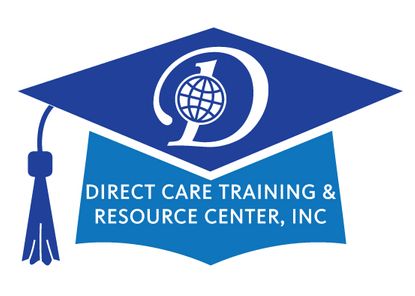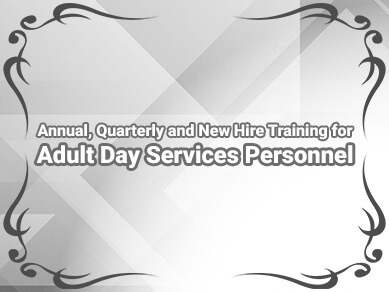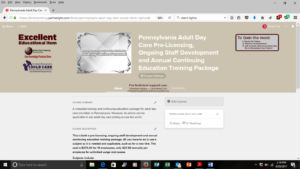 It is our pleasure to serve providers of adult day care in Pennsylvania. Some whom we have watched grow and blossom in professionalism and person centered care include Fox Chase Adult Day Care, Inc. and Golden Age. Of course there are tons of others.
It is our pleasure to serve providers of adult day care in Pennsylvania. Some whom we have watched grow and blossom in professionalism and person centered care include Fox Chase Adult Day Care, Inc. and Golden Age. Of course there are tons of others.
Many are now using the on-line school managed by Direct Care Training & Resource Center, Inc. and we use this Blog area to occasionally provide updates to course objectives and content. (Click Here to view the School)
Frequency: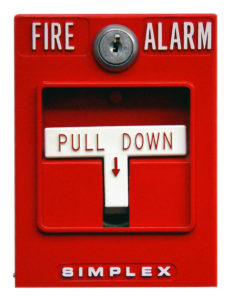
Most training required in Pennsylvania is to be covered within ninety, (90) days of a person’s hiring and then the training on Fire Prevention: Emergency Preparedness is to be reviewed with staff every ninety, (9) days which can be an in-service event. We provide a two, (2) page In-Service Outline for annual training subscribers to use for this purpose. The other requirement is applicable, annual continuing education. Here are the specific and applicable rules taken directly from the Pennsylvania Administrative Code::
Pennsylvania Code – Training Requirements – § 11.33. Program staff orientation and training.
(a) Providers shall, using center staff persons, outside resources, or both, provide program staff persons with the following:
(1) A general orientation in the following areas, within 3 months of employment:
(i) The purpose and goals of older adult daily living services.
(ii) The roles and responsibilities of staff members.
(iii) Positive approach methods to manage behavior.
(iv) Health and safety precautions, including infection control.
(v) Information on fire and safety measures/codes.
(vi) The philosophy of the program and, if applicable, the parent organization.
(vii) Confidentiality.
(viii) Interdisciplinary team approach.
(ix) Client rights.
(x) The population served.
(xi) The center’s policies and regulations.
(xii) Communication skills.
(xiii) The center’s emergency procedures. – Reviewed quarterly.
(2) Training in the following areas, within 3 months of employment and annually thereafter regarding:
(i) The needs of the clients in the center’s target population.
(ii) Body mechanics/transfer techniques.
(iii) Voluntary reporting laws regarding abuse, neglect and exploitation.
(iv) Positive approach methods to manage behavior.
(3) In addition to the general orientation and annual training required in subsection (a)(1) and (2), at least two training sessions, totaling at least 8 hours of training, per year to enhance quality of care and job performance.
(b) A sufficient number of staff persons shall be trained, certified and re-certified in cardio-pulmonary resuscitation and in first aid training so that at least one staff person so trained, certified and re-certified in CPR and first aid training is present in the center at all times.
§ 11.21. Emergency procedures.
(a) Written procedures for handling emergencies shall be developed and be available at the center. The procedures include:
(1) The location of portable emergency information files on each client containing the information in § 11.191 (relating to emergency information).
(2) Evacuation procedures set forth in § 11.82 (relating to evacuation procedures).
(3) Procedures for handling medical emergencies as specified in § 11.134 (relating to emergency medical plan) and non-medical emergencies, including specific staff responsibilities.
(b) Written emergency procedures shall be reviewed with staff persons at least quarterly.
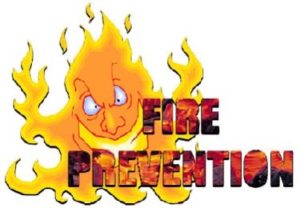 Our product covers every required subject. Within the school, once a client enters into an annual subscription, all staff can use a code and take all of the training. If they desire, every ninety, (90) days instead of re-entering the school they can use the in-service outline to cover Fire Safety & Emergency Procedures.
Our product covers every required subject. Within the school, once a client enters into an annual subscription, all staff can use a code and take all of the training. If they desire, every ninety, (90) days instead of re-entering the school they can use the in-service outline to cover Fire Safety & Emergency Procedures.
On the anniversary each year of the annual subscription, we send an email to the account representative reminding them of what applicable subjects they can choose from for annually required continuing education.
Subjects available for annually required continuing education include:
- Avoiding the Appearance of Sexual Impropriety When Rendering Care
- Rendering Personal Care Safely and With Dignity
- Conducting More Effective Team Meetings
- Wound Prevention and Management
- Reducing Personal Job Stress
- Developing and Maintaining an Effective Sanitation Program
and much more…..
Some request training access in every subject every three, (3) months, citing an unwritten rule. We do not discuss, subscribe to, consider or make arrangements in our on-line school for what some refer to as “unwritten rules”. Our school – and product distribution – are built upon published, established state laws and administrative rules.
Imagine the liability and confusion we create if we altered training subjects, frequency of subject availability and contents in the school based upon one, (1) regulator’s unpublished preferences or one provider’s unpublished preferences. This would cut into our consistency of learning and professionalism one-thousandfold.
Effective August 11, 2017, every Friday, the Validation of Completion is updated which will include what may have been competed during that particular week. Click Here for a look at the Updated Sample Document.
It is our pleasure to serve adult day providers around the world. If you would like more information about products and services specifically designed for the adult day care community please send an email to: onlinelearning@directcaretraining.com. (Note: Telephone support is not available for the on-line school).
Sign-in and share your thoughts.
______________________________________________________________________________________
 For more on our commitment to the success of community based care providers, join the LinkedIn.com Groups:
For more on our commitment to the success of community based care providers, join the LinkedIn.com Groups:
Adult Day Care Innovation & Growth
Nursing Home Administrator Innovation
Small Scale Assisted Living Success Strategies
Our other homes on the web:
www.directcaretraining.com
Contact the Blogger: info@directcaretraining.com
Follow us on…
